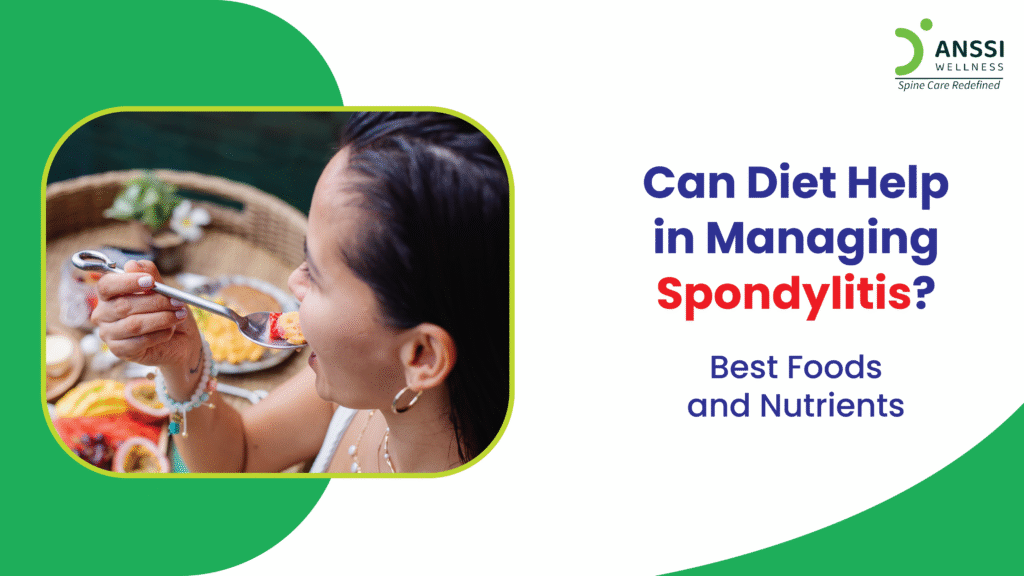Spondylitis, especially ankylosing spondylitis, is a chronic inflammatory condition that affects the spine and sacroiliac joints. It can lead to stiffness, pain, and reduced mobility, particularly in the lower back. While medications, physical therapy, and other non-surgical treatments can play a crucial role in symptom management, many people wonder: Can diet help too?
The short answer is – yes, diet can complement your treatment plan. While it won’t cure spondylitis, a well-balanced, anti-inflammatory diet may help manage pain, reduce inflammation, and support joint health.
Let’s explore which foods and nutrients are best for those living with spondylitis and which ones to avoid.
Understanding the Role of Inflammation in Spondylitis
At its core, spondylitis is an autoimmune disorder marked by chronic inflammation. The immune system mistakenly attacks the joints of the spine, leading to pain, swelling, and stiffness. Over time, this can cause joint damage and even fusion of the vertebrae.
Certain foods are known to promote inflammation in the body, while others have the opposite effect, helping reduce it. By making smart dietary choices, you may be able to decrease the frequency and severity of flare-ups and improve your overall quality of life.
Anti-Inflammatory Nutrients That Help
Focusing on anti-inflammatory nutrients can be a game-changer in managing spondylitis symptoms. Here are some of the most beneficial:
1. Omega-3 Fatty Acids
Omega-3s are powerful inflammation-fighters. They help lower levels of pro-inflammatory cytokines, which play a key role in autoimmune responses.
Sources:
- Fatty fish like Bangda, Rawas, and Rohu
- Flaxseeds and sabja beej
- Walnuts
- Fish oil supplements (after consulting your doctor)
2. Vitamin D and Calcium
People with spondylitis are at increased risk of bone loss and osteoporosis due to inflammation and reduced mobility. Vitamin D helps the body absorb calcium and supports bone density.
Sources:
- Fortified dairy or plant-based milk
- Egg yolks
- Leafy greens like palak and methi
- Sunlight exposure (for natural Vitamin D synthesis)
3. Magnesium and Zinc
These minerals support muscle function, nerve signalling, and immune health. They may help ease muscle cramps and reduce fatigue in spondylitis patients.
Sources:
- Pumpkin seeds, almonds, and cashews
- Legumes and whole grains
- Dark chocolate
- Seafood and lean meats (for zinc)
Foods to Include in a Spondylitis-Friendly Diet
The key to eating for spondylitis relief is choosing whole, nutrient-rich foods that fight inflammation and support joint health. Here are some top picks:
1. Fresh Fruits and Vegetables
Packed with antioxidants, vitamins, and fibre, fruits and veggies are foundational for reducing inflammation and supporting overall wellness.
Best choices:
-
- Berries (blueberries, strawberries)
- Leafy greens (palak, methi, cabbage)
- Cruciferous vegetables (broccoli, cauliflower)
- Sweet potatoes, bell peppers, and carrots
2. Whole Grains
Refined carbs can increase inflammation, but whole grains provide essential nutrients and fibre.
Examples:
- Brown rice
- Quinoa
- Oats
- Barley
3. Nuts and Seeds
In addition to omega-3s, they offer magnesium, protein, and healthy fats.
Best picks:
- Almonds
- Walnuts
- Flaxseeds and chia seeds
- Sunflower seeds
4. Anti-Inflammatory Herbs and Spices
Certain spices have been shown to reduce inflammation and joint pain naturally.
Include:
- Turmeric (with black pepper for better absorption)
- Ginger
- Garlic
- Cinnamon
Foods to Limit or Avoid
While some foods can help ease symptoms, others may worsen them by triggering inflammation or digestive discomfort.
1. Refined Sugars and Processed Foods
Sugary drinks, snacks, and packaged meals can spike inflammation and contribute to weight gain—placing extra stress on your spine.
Examples to avoid:
- Soft drinks and sugary cereals
- Pastries and cookies
- Fast food and instant noodles
2. Red Meat and Saturated Fats
High in arachidonic acid, red meat may increase inflammatory markers when consumed in excess.
Limit:
- Buffalo and sheep/ goat meats
- Processed meats
3. Excessive Dairy
Some people with spondylitis may be sensitive to dairy, which can cause bloating and digestive issues.
Tip: Try switching to lactose-free or plant-based alternatives like almond, soy, or oat milk and monitor how your body responds.
4. Alcohol and Caffeine
Both can dehydrate the body and affect sleep quality; two factors that influence inflammation and pain levels. Moderation is key.
Putting It All Together
Managing spondylitis requires a holistic approach, and diet is an important piece of the puzzle. Think of food not just as fuel, but as a tool to support healing, reduce flare-ups, and improve energy levels.
- Build meals around whole, plant-based foods.
- Add anti-inflammatory nutrients like omega-3s, magnesium, and Vitamin D.
- Avoid ultra-processed, sugary, and high-fat foods that can trigger inflammation.
- Stay hydrated and maintain a healthy weight to reduce stress on joints.
About ANSSI:
ANSSI Wellness focuses on improving the quality of life for patients suffering from spinal issues, aiming to provide relief where other conventional treatments have failed. Through advanced non-surgical spinal decompression treatment, ANSSI is committed to helping patients avoid surgery and recover in a safe, effective, and compassionate environment.
Connect with ANSSI Wellness on LinkedIn, Instagram, and Facebook for expert guidance.




